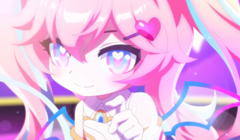In South Korea, female video game developers are facing severe backlash and threats from male gamers who misconstrue innocuous gestures as feminist statements. This witch hunt not only affects personal safety but also severely impacts women's rights and their ability to express feminist views in a deeply patriarchal society.
Witch Hunts in South Korea’s Gaming Industry: Feminism Under Attack

Witch Hunts in South Korea’s Gaming Industry: Feminism Under Attack
A disturbing trend in South Korea sees female game developers targeted for perceived feminist ideologies, revealing a troubling backlash against gender equality.
In a striking illustration of the intersection of gaming culture and gender discrimination, a female animation artist, who has chosen to remain anonymous, was thrust into a storm of online abuse after shared a trailer for a new character in the acclaimed South Korean game, MapleStory. The issue arose from a frame in the trailer where the character made what male gamers perceived as a "feminist gesture," leading to a deluge of threats, doxxing, and demands for her dismissal from her studio.
The reaction was swift and brutal. Young male gamers quickly assumed that the gesture was a symbolic jab at masculinity, specifically linked to a radical feminist context that has been ridiculed online for years. The artist described the barrage of hate she received as "disgusting and inhumane," revealing a disturbing culture in which women expressing any hint of feminism are attacked viciously. “My job was on the line, and I feared I would never work in animation again,” she recounted.
This incident is emblematic of a broader societal backlash against feminists in South Korea. Women are increasingly subjected to online witch hunts, characterized by coordinated harassment campaigns led predominantly by young male gamers. These individuals scrutinize the social media profiles of women in the industry, seeking any evidence they can label as feminist ideology, thereby attempting to undermine their careers.
Minsung Kim, a male gamer who has established a support organization for victims, explains that these hunts have become alarmingly organized. Their tactics involve identifying women as potential threats based solely on misconstrued gestures. "They operate with the mindset that any display of feminism warrants a witch hunt," he lamented.
The repercussions of such ruthless campaigns extend beyond job security to the very fabric of gender rights in the country. South Korea has the largest gender pay gap among OECD nations, and the current political climate stifles discussions of gender equality. Many companies, fearing backlash from these vocal anti-feminist groups, have started censoring their content. Some even resort to editing character animations to avoid any associations with feminism.
A striking reflection of these societal issues is seen in the case of Jigu—a victim of a violent attack rooted in anti-feminist sentiment. She suffered serious injuries after being targeted for simply having short hair, an arbitrary sign that led an attacker to label her a feminist. With permanent damage and psychological scars from the incident, she has emerged as a bold advocate, challenging the narrative that feminism is synonymous with hating men.
Both Jigu and Darim's experiences underscore a systemic issue within South Korean society—the deeply ingrained misogyny and a culture where expressions of feminism can lead to violence and professional ruin. As the authorities have shown reluctance to protect victims, social activist groups are pushing for systemic changes.
In light of persistent harassment and attacks, female activists are regrouping to redefine feminism in the societal lexicon. Efforts are underway to galvanize legal changes that would protect women's rights. Meanwhile, Minsung believes the key to dismantling this toxic culture lies in companies and authorities recognizing the disproportionate influence of a minority.
“I want to help other victims like me,” Jigu asserts, affirming her commitment to not just recover, but actively engage in the fight for gender equality that remains under siege in South Korea.






















